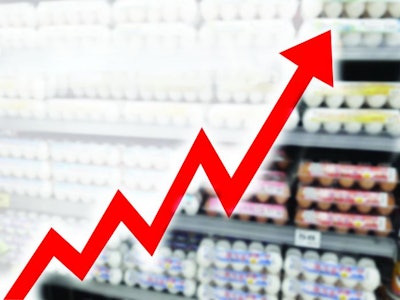
A typical free range egg farm in the U.K. is on course to lose more than GBP300,000 (US$382,000) per flock, as the cost of feed, electricity, labor and other inputs continues at record levels.
Farmers are thought to be losing almost GBP10 per hen, according to data published by consultants ADAS in October.
ADAS puts the total average cost of a flock of 32,000 laying hens at GBP1.24 million, with average income from egg sales bringing in only GBP921,000.
Approximately 64% of the 11.3 billion eggs produced in the U.K. each year are free range and, at retail level, they now account for 70% of all eggs sold, according to data published by industry body the British Egg Industry Council. A contraction in the free-range sector could impact the availability of locally produced eggs and see imports increase.
Some producers have already ceased production and, according to Robert Gooch, Chief Executive Officer of the British Free Range Egg Association (BFREPA), the whole industry now needs to work together to fix the broken market.
"It is of the upmost importance that we do everything we can do to bring about positive change in the industry, so that producers receive the support and success that they need," he said.
United action needed
To this end, earlier this year, BFREPA launched the Egg Pledge, which aims to unite the sector behind a commitment to work together for a better, more sustainable future. BFREPA is urging all businesses involved in free range egg production to sign it.
The pledge was initiated following campaigning for a fair deal for farmers hit by rocketing production costs. At its launch, in late September, Gooch noted that farmers had seen their feed costs rise by 50% and that many had seen their total bills increase by tens of thousands of pounds
As well as calling on producers to sign the pledge, BFREPA has been approaching packers and retailers to garner their support, but the latter have not been that forthcoming. However, with multiples and discounters accounting for almost 87% of egg sales to consumers in the U.K., their support is essential.
Gooch noted that egg producers had seen small rises in the price paid for their eggs, but nowhere near enough for their businesses to be sustainable.
In July the association revealed that U.K. consumers were typically paying GBP0.20 more for a dozen free range eggs, but that only GBP0.04 was reaching producers. At that time, it was suggested that producers needed to receive at least GBP0.40 if parts of the industry were not to cease production.
Some retailers have committed to not importing cheaper eggs, but Gooch noted that supermarkets had been unresponsive to the suggestion of higher payments and warned that, within six to nine months, there could be a shortage of U.K. free range eggs.
The industry predicts that both production costs and demand for eggs will continue to increase over the winter months, making the industry increasingly unsustainable and causing many more farms to suffer as the crisis continues.
U.K. egg industry in crisis as input costs soar
















